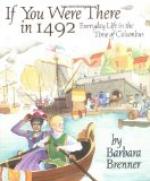Now Columbus was one of those men of divining minds, who must have general theories on which to thread their observations; and, as few persons have so just a claim to theorize as those who have added largely to the number of ascertained facts (a privilege which they generally make abundant use of), so Columbus may well be listened to, when propounding his explanation of the wonderful change in sea, air, sky, and magnetic current, which he discerned at this distance of a hundred leagues from the Azores.
His theory was, that the earth was not a perfect sphere, but pear-shaped; and he thought that, as he proceeded westwards in this voyage, the sea went gradually rising, and his ships rising too, until they came nearer to the heavens. It is very possible that this theory had been long in his mind, or, at any rate, that he held it before he reached the coast of Paria. When there, new facts struck his mind, and were combined with his theory. He found the temperature much more moderate than might have been expected so near the equinoctial line, far more moderate than on the opposite coast of Africa. In the evenings, indeed, it was necessary for him to wear an outer garment of fur. Then, the natives were lighter coloured, more astute, and braver than those of the islands. Their hair, too, was different.
Then, again, he meditated upon the immense volume of fresh waters which descended into the Gulf of Paria. And, in fine, the conclusion which his pious mind came to, was, that when he reached the land which he called the island of Gracia, he was at the base of the earthly Paradise. He also, upon reflection, concluded that it was a continent which he had discovered, the same continent of the east which he had always been in search of; and that the waters, which we now know to be a branch of the river Orinoco, formed one of the four great rivers which descended from the garden of Paradise.
Very different were the conjectures of the pilots. Some said that they were in the Sea of Spain, others, in that of Scotland, and, being in despair about their whereabouts, they concluded that they had been under the guidance of the Devil. The admiral, however, was not a man to be much influenced by the sayings of the unthoughtful and the unlearned. He fortified himself by references to St. Isidro, Beda, Strabo, St. Ambrose, and Duns Scotus, and held stoutly to the conclusion that he had discovered the site of the earthly Paradise. It is said, that he exclaimed to his men, that they were in the richest country in the world.
Columbus did not forget to claim, with all due formalities, the possession of this approach to Paradise, for his employers, the Catholic Sovereigns. Accordingly, when at Paria, he had landed and taken possession of the coast in their names, erecting a great cross upon the shore, which, he tells Ferdinand and Isabella, he was in the habit of doing at every headland, the religious aspect of the conquest being one which always had great influence with the admiral, as he believed it to have with the Catholic monarchs. In communicating this discovery, he reminds them how they bade him go on with the enterprise, if he should discover only stones and rocks, and had told him that they counted the cost for nothing, considering that the Faith would be increased, and their dominions widened.




